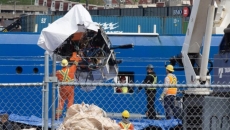The federal government has issued just two fines under a four-year-old law meant to prevent boat owners from leaving their vessels behind for someone else to clean up when they are shipwrecked or reach the end of their lifespan.
Vancouver Island NDP MP Lisa Marie Barron says that's not good enough, given the Liberal government promised it would stop giving a free pass to boat owners who dump their dirty old vessels in Canadian harbours and waterways.
"Even though the government put into place the act, we're just not seeing the action following through," said Barron.
❌🌊 Despite announcing a freeze on #deepseamining in Canadian waters, #Trudeau falls short in calling for the same internationally. This refusal to follow other G20 countries, is beyond concerning. It's time our government prioritizes the protection of our #oceans./1 pic.twitter.com/HkUKVEigrP
— Lisa Marie Barron (@LisaMarieBarron) July 6, 2023
The government introduced the Wrecked, Abandoned or Hazardous Vessels Act in 2017. It passed in February 2019 and took effect that July. It made it illegal to abandon a boat in Canada and gives the government the power to go after boat owners when their vessels are wrecked or left behind, including fines up to $1 million.
The law is both meant to be a deterrent to abandoning a boat, but also to allow the government to hold owners liable for the costs of removal if they do it anyway.
Depending on the size of the boat and its contents, removal costs can range from several thousand dollars to well into the millions.
There are currently 1,748 boats listed in the national inventory of abandoned and wrecked vessels. More than one-third are small motorboats and sailboats under 12 metres in length.
Almost 400 are fishing boats of varying lengths, and there are 66 barges, 20 cargo ships and 89 classified as "other" which includes oil tankers.
Almost 70 per cent of them are in British Columbia, followed by Quebec with 14 per cent and the Atlantic with 10 per cent.
The government says it has removed more than 500 boats from shorelines, harbours and other marine areas since 2019, but the Canadian Coast Guard was not equipped until now to fine owners who refused to comply with orders to remove their vessels.
"Generally what we were doing was just conducting the remediation," said Paul Barrett, the superintendent of compliance and enforcement for the coast guard's Western region.
That meant if the boat's owner was known and could be found, a compliance order would be issued directing them to safely remove the vessel. If they couldn't be found or the owner did not comply the coast guard would take on the removal work itself.
But only this spring was the coast guard able to start issuing fines if those orders weren't followed.
The first coast guard fine was issued June 27 to an individual whose eight-metre long white cabin cruiser ran aground in Vancouver Island's Cadboro Bay in March. Barrett said the coast guard was trying to work with him to remove the boat, and issued directions for him to develop a salvage plan and then carry out the plan.
Neither happened, so the boat owner was fined $15,000.
The only other fine issued was by Transport Canada in November 2021. A man was fined $5,000 for leaving a dilapidated vessel "stranded, grounded or moored in the same location for a period of 60 consecutive days."
In answer to a written question posed in the House of Commons by Barron in April, the government said that fine has still not been paid.
Barron said the fines have to be levied to ensure compliance. They should also be bigger than what it would cost to remove the boat in the first place.
Barrett said they generally are, noting the fines can accrue daily for every day an owner doesn't comply with a salvage and removal order. That has not happened in either of the two cases where fines were issued thus far.
Barrett said the coast guard manages the national database of abandoned boats, and assesses all newly reported vessels. It is then responsible for any boats deemed to be hazardous but for those merely considered abandoned or derelict but not immediately hazardous, it hands the file over to Transport Canada to manage.
Many of those in the non-hazardous category are historical abandonments for which finding or fining an owner is not possible.
That would include, for example, the Conestoga, an ironclad wooden steam freighter that sank in the St. Lawrence River in 1922 and is now a popular spot for scuba divers.
However it's difficult to ascertain much information about most of the boats on the list, as the publicly available data doesn't include the dates the ships were abandoned, their condition or whether orders have been issued for their removal.
Barrett said the coast guard does an assessment of every boat added to the national inventory and ranks it using a risk-assessment tool to determine where it should fall in the priority list for action.
That information is just not being made public.






